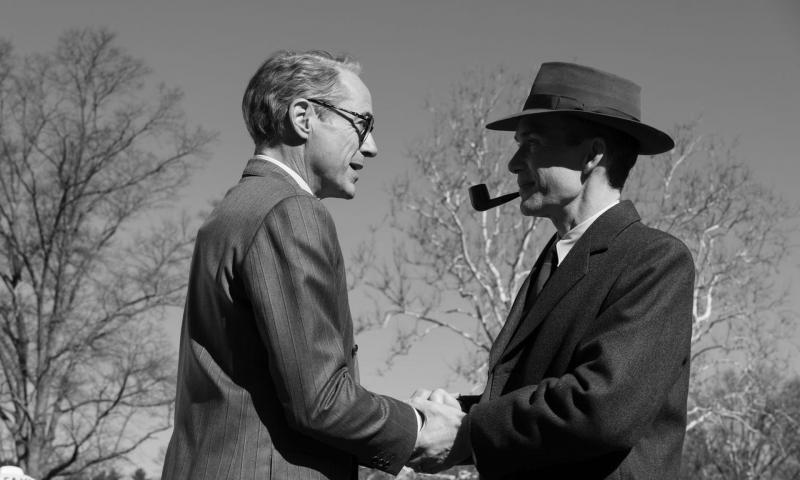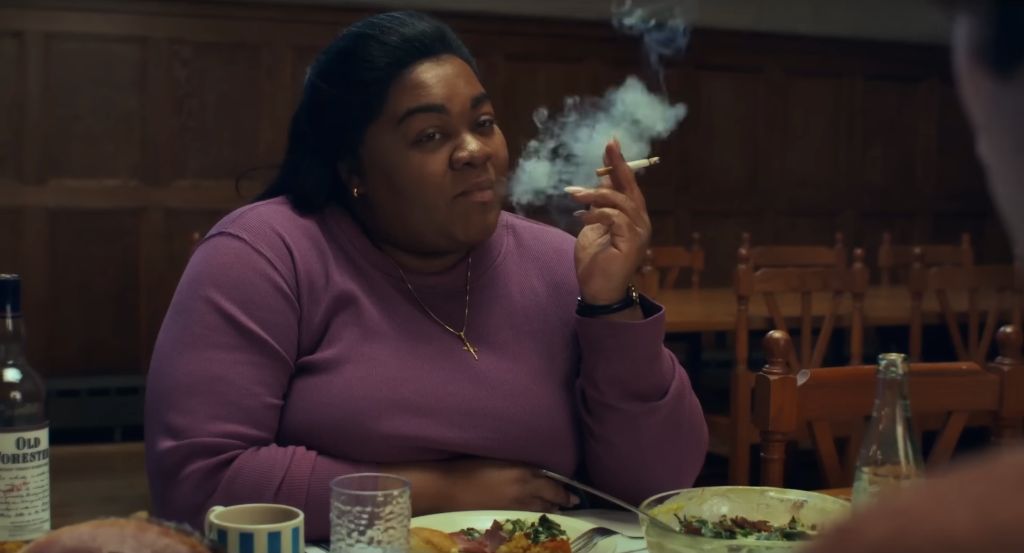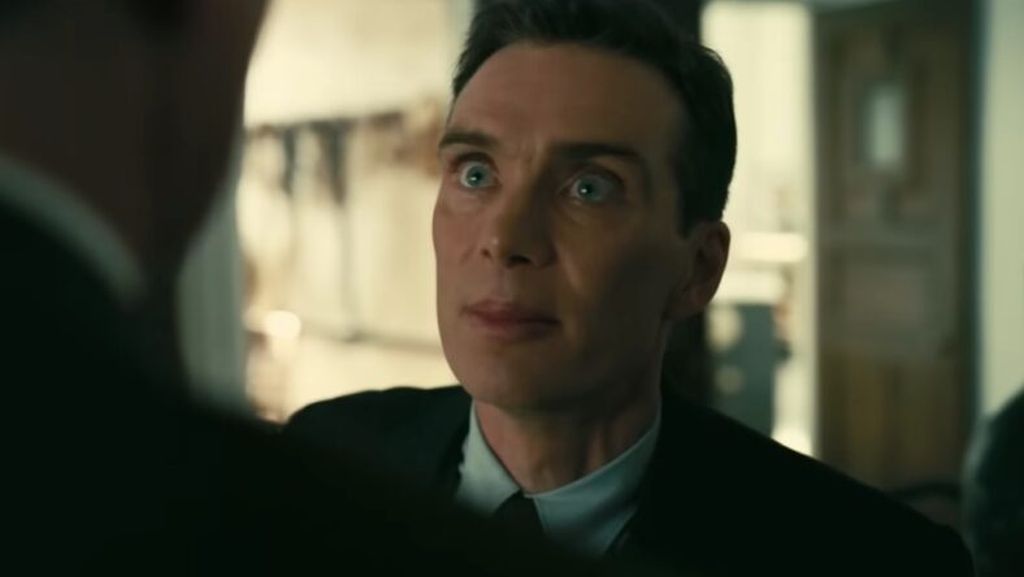Oscars 2024: politics aplenty but few surprises as 'Oppenheimer' dominates | reviews, news & interviews
Oscars 2024: politics aplenty but few surprises as 'Oppenheimer' dominates
Oscars 2024: politics aplenty but few surprises as 'Oppenheimer' dominates
Christopher Nolan biopic wins big in a ceremony defined by a pink-clad Ryan Gosling and Donald Trump seeing red

Oppenheimer as expected dominated the 96th Academy Awards, winning seven trophies whilst runner-up Poor Things took four prizes, including Emma Stone in the hotly contested category of best actress.
There was a pro forma feeling to the roll call of winners under host Jimmy Kimmel's eye that saw, across nearly 3.5 hours, Christopher Nolan, Cillian Murphy, and Robert Downey Jr win as best director, actor, and supporting actor, respectively – all prizes they had been expected to take.
The same was true of Da'Vine Joy Randolph's supporting actress nod as Mary Lamb, the grieving cafeteria manager in The Holdovers, whose exuberant acceptance speech made a great virtue of thanking her publicist without ever naming the actual person. (Nor did Randolph, pictured below, left, thank anyone connected to Alexander Payne's rueful comedy, though she has of course had ample opportunity to do so in her clean sweep of this film season's prizes in that category.)
The best actress prize, deemed a toss-up between 2017 winner Emma Stone and first-time nominee Lily Gladstone, for Killers of the Flower Moon, in the end went to a notably hoarse Stone (pictured below, right), who gave a gracious shout-out to a visibly moved Gladstone whilst trying to navigate an apparently broken dress. Yorgos Lanthimos, Stone's Poor Things director, has form when it comes to delivering actresses unexpectedly to the Oscar podium: Olivia Colman managed a comparable feat five years ago for Lanthimos's period drama The Favourite, in which Colman pipped to the post frequent Oscar also-ran Glenn Close.
 Elsewhere, for the most part the tipsters were right. Anatomy of a Fall and American Fiction won the screenplay categories, the latter film's Cord Jefferson wondering aloud what it might be like if Hollywood took 200 million dollars to make not one blockbuster but 20 $10 million movies or 50 $4 million ones – the intention, clearly, being to share the wealth. And the international film prize went, for the first time, to a UK entry, The Zone of Interest. Appealing to a cessation of conflict in the Middle East, writer-director Jonathan Glazer advised us to consider "where dehumanisation leads at its worst" as we laud a film set during the Holocaust that, Glazer said, is every bit as much about now as about then.
Elsewhere, for the most part the tipsters were right. Anatomy of a Fall and American Fiction won the screenplay categories, the latter film's Cord Jefferson wondering aloud what it might be like if Hollywood took 200 million dollars to make not one blockbuster but 20 $10 million movies or 50 $4 million ones – the intention, clearly, being to share the wealth. And the international film prize went, for the first time, to a UK entry, The Zone of Interest. Appealing to a cessation of conflict in the Middle East, writer-director Jonathan Glazer advised us to consider "where dehumanisation leads at its worst" as we laud a film set during the Holocaust that, Glazer said, is every bit as much about now as about then.
But this year's ceremony will be as vividly remembered for what happened in-between the giving out of gongs. A wonderfully game Ryan Gosling, clad in pink, generated rave-style hysteria with an epic rendition of Barbie rouser "I'm Just Ken" that featured a surprise appearance from Guns N' Roses guitarist Slash. Donald Trump – yes, him – was quoted late on to have been dissing the show in a Truth Social "review" that was read out loud by Kimmel, the host, who then asked of the presidential hopeful currently facing 91 felony charges, "isn't it past your jail time"?
 That was a fine feisty moment that came near the end of a middling Oscars, inspired in places and desperate in others, with Kimmel – marking his fourth appearance as host (and his second consecutive one) – getting off some choice zingers and also some real duds. A question early on about Robert Downey Jr's "rectangular penis" didn't land at all, but was at least less tasteless than one about Germany possibly regarding The Zone of Interest, Kimmel quipped, "as a romcom". One had to feel at that moment for Sandra Huller, the splendid German actress (and nominee for Anatomy of a Fall) who is the female lead in Zone and who didn't need to travel all this way to field a joke worthy of, well, Donald Trump.
That was a fine feisty moment that came near the end of a middling Oscars, inspired in places and desperate in others, with Kimmel – marking his fourth appearance as host (and his second consecutive one) – getting off some choice zingers and also some real duds. A question early on about Robert Downey Jr's "rectangular penis" didn't land at all, but was at least less tasteless than one about Germany possibly regarding The Zone of Interest, Kimmel quipped, "as a romcom". One had to feel at that moment for Sandra Huller, the splendid German actress (and nominee for Anatomy of a Fall) who is the female lead in Zone and who didn't need to travel all this way to field a joke worthy of, well, Donald Trump.
Far more salutary was Murphy's dedication of his prize for a movie about the atomic bomb to "the peacemakers everywhere", or Kimmel's tribute to the union workers at a time when Hollywood is still reeling from a lengthy shutdown. Political engagement was in evidence throughout – less the #MeToo or #OscarsSoWhite causes of recent years and more our conflict-laden world. That was acknowledged by Glazer but also by Ukrainian filmmaker Mstyslav Chernov, who said rendingly of his trophy-bearing documentary 20 Days in Mariupol, "I wish I'd never made this film", having been forced into doing so by Russia's attack on his homeland.
 The best song nominees included Scott George and the Osage People's “Wahzhazhe (A Song for My People)”, an Oscar first for the indigenous community in the same way as was the nomination for that film's leading lady Gladstone: in the end, Killers of the Flower Moon went home empty-handed and the song award went to 22-year-old Billie Eilish for "What Was I Made For?" from Barbie. This was the second Oscar, age 22, for Eilish, who looked for all the world like a younger Cillian Murphy (pictured above). A similar affinity was clocked between best actress nominee Carey Mulligan (Maestro) and the acting great, Jessica Lange, who introduced her performance from the stage. Should Lange's life at some point ever become a film, they could do worse than tip Mulligan the nod. Not much was achieved in the In Memoriam section, speaking of tipping nods, which was badly filmed and seemed to focus more on a random array of dancers than the legacy of the deceased.
The best song nominees included Scott George and the Osage People's “Wahzhazhe (A Song for My People)”, an Oscar first for the indigenous community in the same way as was the nomination for that film's leading lady Gladstone: in the end, Killers of the Flower Moon went home empty-handed and the song award went to 22-year-old Billie Eilish for "What Was I Made For?" from Barbie. This was the second Oscar, age 22, for Eilish, who looked for all the world like a younger Cillian Murphy (pictured above). A similar affinity was clocked between best actress nominee Carey Mulligan (Maestro) and the acting great, Jessica Lange, who introduced her performance from the stage. Should Lange's life at some point ever become a film, they could do worse than tip Mulligan the nod. Not much was achieved in the In Memoriam section, speaking of tipping nods, which was badly filmed and seemed to focus more on a random array of dancers than the legacy of the deceased.
All four acting categories reverted to the custom introduced some years ago of having five performers – previous Oscar winners all – sing the praises of the current nominees, with last year's winner presenting the actual prize. Unusually, given the increasing internationalisation of the Oscars of late, three of the four winners in this year's acting categories were American, whereas last year just two were and in 2021 only one.
While fashion pages will surely be parsing the various outfits on display for weeks to come, the biggest noise on the sartorial front was arguably made by presenter John Cena, who showed up seemingly naked to present best costumes, though he did cover up eventually. (The moment was a nod to the famous streaker incident at the 1974 Oscars.)
Other memorable appearances, fully clothed you'll be glad to know, were the double-acts of onetime Twins stars Danny DeVito and Arnold Schwarzenegger (1988 was a long time ago now) and current Wicked leading ladies Cynthia Erivo and Ariana Grande, whose clothes were colour-coded to match the characters they are playing in the adaptation of the hit stage musical. Less felicitous was the lamebrained banter of too many presenters – Melissa McCarthy should be ashamed – during which I was put in mind of last year's Tony Awards in New York, where the writers' strike meant such scripted nonsense had to be abandoned and no one missed it at all. An earlier-than-usual start to these Oscars, coupled with daylight savings time having begun yesterday in the US, meant the ceremony was over at a time when, in many a previous year, it would just be getting going. I suppose that's one definition of progress.
Weirdest of all was the announcement from Kimmel near the end that the ceremony, despite a late start, was running ahead of schedule, which meant that anyone who might wish to could line up in an orderly fashion to make their way to the podium. No one, thank heavens, took Kimmel at his word, or we'd likely be there still.
The future of Arts Journalism
You can stop theartsdesk.com closing!
We urgently need financing to survive. Our fundraising drive has thus far raised £49,000 but we need to reach £100,000 or we will be forced to close. Please contribute here: https://gofund.me/c3f6033d
And if you can forward this information to anyone who might assist, we’d be grateful.

Subscribe to theartsdesk.com
Thank you for continuing to read our work on theartsdesk.com. For unlimited access to every article in its entirety, including our archive of more than 15,000 pieces, we're asking for £5 per month or £40 per year. We feel it's a very good deal, and hope you do too.
To take a subscription now simply click here.
And if you're looking for that extra gift for a friend or family member, why not treat them to a theartsdesk.com gift subscription?

Add comment